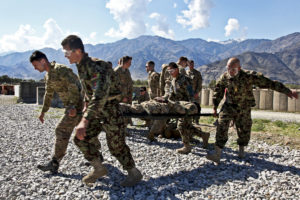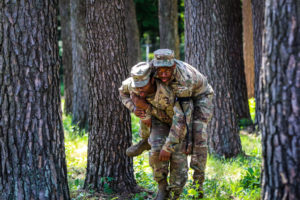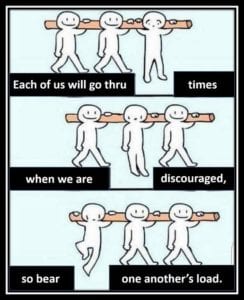“In the past you have encouraged many people;
you have strengthened those who were weak.
Your words have supported those who were falling;
you encouraged those with shaky knees.
But now when trouble strikes, you lose heart.
You are terrified when it touches you.” (Job 4:3-5, NLT)
The Human Condition

These words were spoken by Job’s friend Eliphaz, the Temanite. To his credit, Eliphaz sat beside his friend for seven straight days without speaking a single word. Job’s grief was far too great to be patched up with a pep talk. Job had lost all ten of his children, all his possessions, and was covered from head to toe with sores.
But now Eliphaz’s patience is spent. And when Job voices his anguish, Eliphaz is offended by the harshness of Job’s words. So he basically tells Job, “Come on, Job. You gave so much encouragement to others. Why don’t you take your own medicine and encourage yourself.”
This is somewhat like what the mockers of Jesus did. Remember how, as Jesus hung from the cross, they admonished Him. “He saved others. Let Him save Himself” (Luke 23:35), and “Physician, heal yourself” (Luke 4:23).
Give and Receive

Don’t be caught doing this to your pastor, leader, or friend. Sure, they’ve given tons of encouragement to others. But now they’re under attack from an unseen enemy, as Job was. Now they’re broken and hurting. And whenever we are in such a state our ability to administer cures—to ourselves or others—is impaired. Instead of carrying burdens, we become one ourselves.
But that’s OK. We all have those times when we’re completely immobilized with adversity. That’s why we have to be ready to both give and receive encouragement, to help and receive help, and to nurture and receive nurturing from others. And leaders and pastors require this as much as anyone else.
Teamwork
 You’ve probably seen that little cartoon of three people carrying a log. All three share the burden. But then the group comes to a hole in the ground, where one of them has no footing. So instead of helping carry the log he hangs on and becomes a burden rather than a blessing. But once he gets past the hole, he can carry again. But the one behind him must now contend with the hole, while the other two carry him. Finally, the last one faces the hole, but the other two support him.
You’ve probably seen that little cartoon of three people carrying a log. All three share the burden. But then the group comes to a hole in the ground, where one of them has no footing. So instead of helping carry the log he hangs on and becomes a burden rather than a blessing. But once he gets past the hole, he can carry again. But the one behind him must now contend with the hole, while the other two carry him. Finally, the last one faces the hole, but the other two support him.
This is so much like life. We try to help bear the load and carry the burden. We don’t want to burden others with our problems. But when grief or discouragement comes, we just can’t get our footing and we must be carried. Therefore, grant validity to your own need for help. Grant validity to the need of others for help. The same apostle who said, “Everyone must carry his own load” (Galatians 6:5) also said, “Bear one another’s burdens and thus fulfill the law of Christ” (Galatians 6:2).
PRAYER
Dear Father in heaven, it seems we will all take our turn at bearing burdens and being burdens. We’ll all be called upon to encourage the downcast, and be downcast ourselves. Please help me to never withhold encouragement and help from anyone. Remind me that it’s no sin to be wounded and broken. But it is a sin to withhold compassion from those who are hurting. Amen.
Photos in order of appearance:
Mock casualty by the U.S. Army. Licensed under CC BY 2.0.
I Will Never Leave a Fallen Comrade by the U.S. Army. Licensed under CC BY 2.0.
No source







